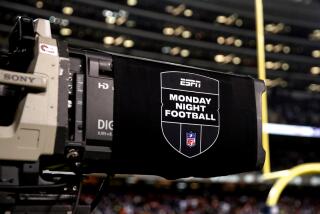Univision owners preparing exit plan
Univision Communications’ owners are looking for an exit.
Seven years ago, Los Angeles billionaire Haim Saban and four private equity firms spent $13.7 billion to acquire Univision, the nation’s dominant Spanish-language media company. They figured they could make a huge profit because of the growing presence of Latinos in the U.S.
Now, Saban and the private equity firms are preparing to find out just how much money they might make.
The group plans to sell its stakes in Univision within the next year, hoping to get as much as $20 billion for the company, according to people familiar with the group’s strategy but who are not authorized to discuss the matter publicly.
Univision’s owners would like to capitalize on a wave of media consolidation. Already this year, cable giant Comcast Corp. has announced plans to buy rival Time Warner Cable. Telephone giant AT&T last month unveiled its own planned $49-billion takeover of satellite TV operator DirecTV.
During the last three months, representatives at Univision approached several major media companies to gauge their interest in buying Univision. The Wall Street Journal reported late Thursday that Univision has had preliminary discussions with CBS Corp. and Time Warner Inc.
However, people close to CBS and Time Warner downplayed any interest in Univision. They said there have been no negotiations to buy Univision, which boasts the nation’s fifth largest television network, cable channels and a chain of popular Spanish-language radio stations.
Univision declined to comment.
Meanwhile, other media companies have said they are not interested. Viacom Inc. doesn’t consider Univision a strategic fit. Rupert Murdoch’s 21st Century Fox would face difficulty buying Univision because of federal rules on media consolidation. Both companies own dozens of TV stations, and a Fox purchase of Univision would violate the TV-station ownership cap.
CBS also would run into problems with the Federal Communications Commmission’s TV-station ownership rules. CBS already owns 29 TV stations, including two stations in each of the nation’s largest markets, Los Angeles and New York. Adding Univision’s stations would be hugely problematic -- unless the FCC were to relax rules governing media consolidation.
Univision’s owners also have considered a public stock offering. An IPO would allow Grupo Televisa -- Mexico’s largest entertainment company -- to keep its interest in the company.
Televisa currently owns about 9% interest, and it has the rights to increase its ownership stake to about 38% of the company.
In addition to Saban, Univision’s ownership group includes Providence Equity Partners, Texas Pacific Group, Madison Dearborn Partners and Thomas H. Lee Partners.
Private equity firms typically like to flip their investment within five years, and this group has owned Univision for more than seven.
It has been hoping to pay down Univision debt and time a sale to take advantage of favorable lending rates.
Some outside investors have said they expect Univision to go on the block sometime this fall when Univision can brag about high ratings for its broadcasts of soccer’s World Cup, which got underway in Brazil this week.
As the nation’s largest Spanish-language media company, Univision is expected to attract interest. More than 3 million people regularly tune in to watch Univision’s prime-time line up, particularly the spicy telenovelas produced by Televisa.
Still, Univision faces challenges. Demographic patterns have shifted in recent years, and now more Latinos are born in the U.S. than arrive each year from foreign countries.
U.S.-born Latinos are more likely to speak English and so are less inclined to watch only Spanish-language TV -- and that could limit Univision’s growth.
In recent years, media companies -- including Univision -- have put more emphasis on attracting young English-speaking Latinos.
Univision has a 50/50 joint venture with ABC on a cable channel called Fusion. Univision also has a minority stake in El Rey, an English-language cable channel aimed at young men and co-owned by film director Robert Rodriguez.
Univision has proven to be a more problematic investment than the owners anticipated when they won a hard-fought auction in 2006 to buy the company.
Soon after they took over Univision in 2007, the advertising market collapsed.
Univision struggled to pay down debt. The owners then endured years of battles with Televisa, which held back Internet rights to its popular programming and took Univision to court.
Televisa and Univision eventually resolved their disputes, and Televisa invested $1 billion in Univision in 2010. Televisa also agreed to extend its program license agreement with Univision.
Over the last two years, Univision’s finances have improved dramatically as the company has added cable channels, including Univision Deportes, a sports network whose popularity has exploded.
Nonetheless, Univision -- which once commanded nearly 80% of the Spanish-language media market -- has been looking over its shoulder.
NBCUniversal’s Spanish-language operation, Telemundo, has been making ratings gains with dramas it produces and owns. NBCUniversal has been investing heavily in Telemundo, and helping to load up on sports.
Telemundo three years ago outbid Univision by agreeing to pay nearly $600 million for the rights to the next two World Cup soccer tournaments.
This summer’s action will be the last World Cup soccer tournament Univision will broadcast -- at least for the next eight years.
Staff writer Joe Flint contributed to this report.
More to Read
From the Oscars to the Emmys.
Get the Envelope newsletter for exclusive awards season coverage, behind-the-scenes stories from the Envelope podcast and columnist Glenn Whipp’s must-read analysis.
You may occasionally receive promotional content from the Los Angeles Times.







